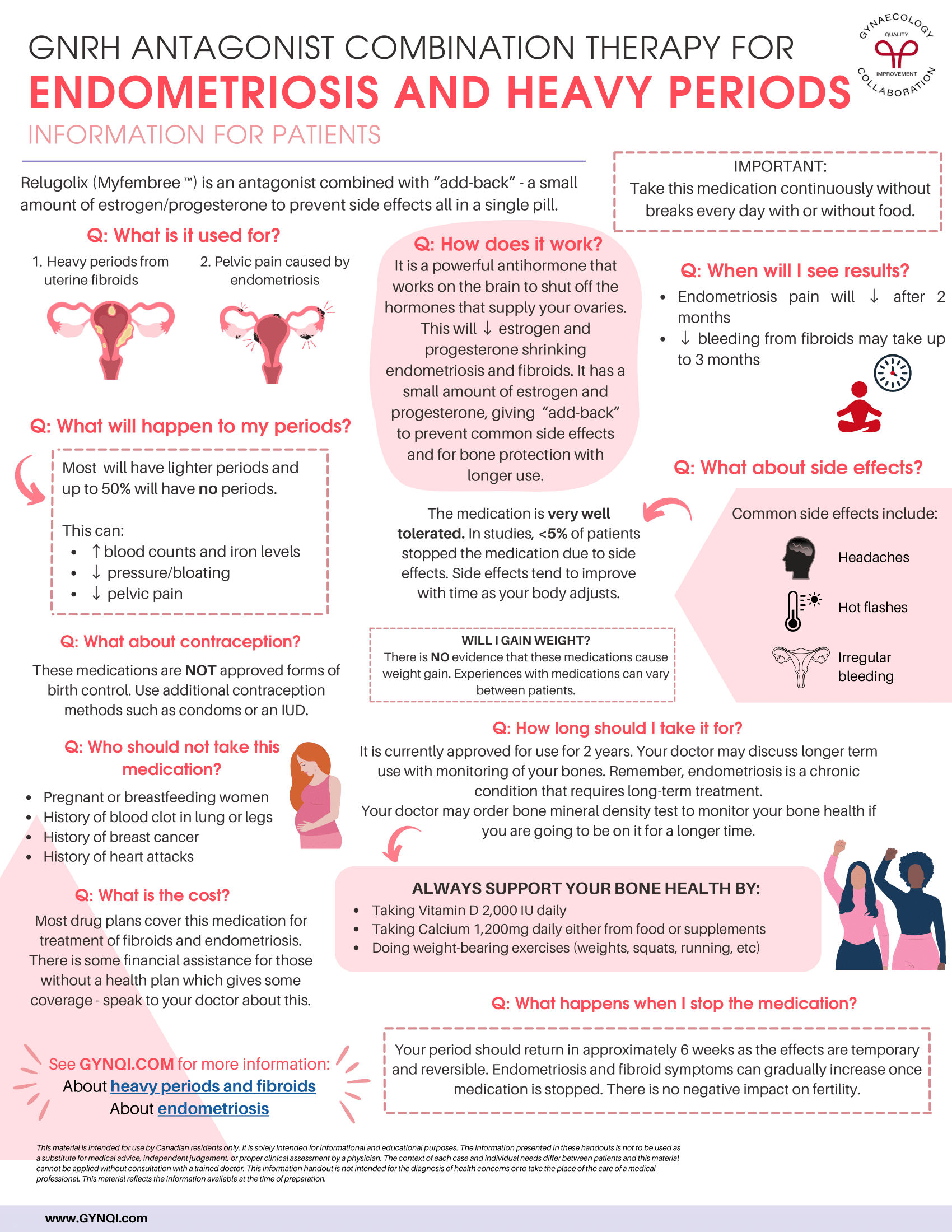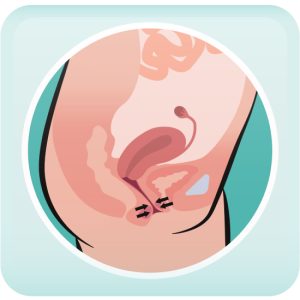Table of Contents
- Summary
- Introduction
- Combination Therapy: How Can it Help?
- What is Relugolix (Myfeebree™)?
- What is It Used For?
- How Do Antagonists Work?
- What are the Potential Side Effects?
- How Long Do I Take Medication For?
- What is the Cost?
- What Will Happen to My Periods?
- What Do I Use for Contraception?
- Who Should Not Take This Medication?
- A Proactive Way to Manage Endometriosis & Uterine Fibroids
Summary:
- Antagonist combination therapies are daily oral medications that combine an antagonist with “add-back” estrogen/progesterone to prevent side effects, helping to shrink fibroids and manage endometriosis symptoms.
- These medications treat heavy periods from uterine fibroids and pelvic pain from endometriosis.
- They reduce estrogen and progesterone production, with added hormones to minimize side effects and protect bone-density health during long-term use.
- Common side effects include headaches, hot flashes and irregular bleeding. Bone-density loss may occur with long-term use, but most symptoms improve over time.
- Medication is approved for up to two years, but long-term use may be discussed with your doctor. Regular monitoring of bone-density health is recommended, along with supplements like vitamin D and calcium for support.
Antagonist combination therapy with Relugolix (Myfembree™) offers a promising solution for managing symptoms of endometriosis and uterine fibroids. By reducing hormone levels and including a small dose of estrogen and progesterone to prevent negative side effects, this convenient daily pill helps relieve heavy periods and pelvic pain.
Whether you’re dealing with fibroids, endometriosis or both, this treatment is designed to make ongoing symptom management easier, with the added benefit of protecting your bone density in the long term.
Combination Therapy: How Can It Help?
A combination medication contains two or more active ingredients that work together to treat a condition more effectively than a single drug alone. This approach can target different aspects of a disease or help reduce side effects by balancing the effects of each component.
What is Relugolix (Myfembree®)?
This medication is an antagonist combined with an “add-back” component–a small amount of estrogen/progesterone added that works to prevent side effects in one convenient pill.
Heads up! This medication must be taken continuously, without breaks, every day with or without food.
What is It Used For?
Combination therapy helps relieve symptoms caused by:
- Heavy periods from uterine fibroids
- Pelvic pain caused by endometriosis
How Do Antagonists Work?
This powerful anti-hormone works by signalling the brain to reduce the production of estrogen and progesterone, effectively helping to shrink endometriosis and fibroids. A small dose of estrogen and progesterone is added to prevent common side effects and protect your bones with extended use.
What are the Potential Side Effects?
This medication is generally easy on the system, with less than 5% of people stopping due to side effects in studies. Most side effects, if they happen, generally get better over time as your body gets used to it.
Side effects include:
- Headaches
- Hot flashes
- Irregular bleeding
- Bone-density loss has been observed with long-term use
Experiences tend to vary between patients. Currently, there is no evidence that these medications cause weight gain, and there is no negative impact on fertility.
How Long Do I Take Medication For?
Endometriosis is a chronic condition and long-term management is key. This medication is approved for use for up to two years, but your doctor might discuss longer-term treatment and careful monitoring of your bones. If extended use is recommended, be sure to keep an eye on your bone density health with regular testing.
You can support your bone health with:
- Vitamin D: Taking 2,000 IU daily
- Calcium: Taking 1,200mg daily either from food or supplements
- Weight-bearing exercises: weights, squats, running, etc.
What is the Cost?
Most drug plans cover treatment for fibroids and endometriosis, but if you’re not covered, don’t worry—there are options. Talk to your doctor about available financial assistance to help with the cost.
What Will Happen to My Periods?
Most patients will have lighter periods, while up to 50% will have no periods.
This can:
- Increase blood counts
- Increase iron levels
- Decrease pressure and bloating
- Decrease pelvic pain
After stopping medication, your period should return in approximately six weeks as the effects are temporary and reversible. However, endometriosis and fibroid symptoms can gradually increase once medication is stopped.
What Do I Use For Contraception?
Antagonist combination therapy isn’t a form of birth control, so you’ll still need to use a contraceptive. Condoms or an IUD are some of the options you can use.
Who Should Not Take This Medication?
Certain individuals should avoid these medications and treatments. Be sure to consult your healthcare provider before starting new therapies.
- Pregnant or breastfeeding women
- Those with a history of blood clots in lungs or legs
- Those with a history of breast cancer
- Those with a history of heart attacks
A Proactive Way to Manage Endometriosis & Uterine Fibroids
Antagonist combination therapy with Relugolix (Myfembree™) provides a proactive approach to managing the symptoms of endometriosis and uterine fibroids. With its ability to regulate hormone levels and minimize side effects, this convenient daily pill offers effective relief from heavy periods and pelvic pain.
Relugolix ensures ongoing care while safeguarding your bone density. This makes it a versatile option for managing symptoms from both endometriosis and uterine fibroids.




